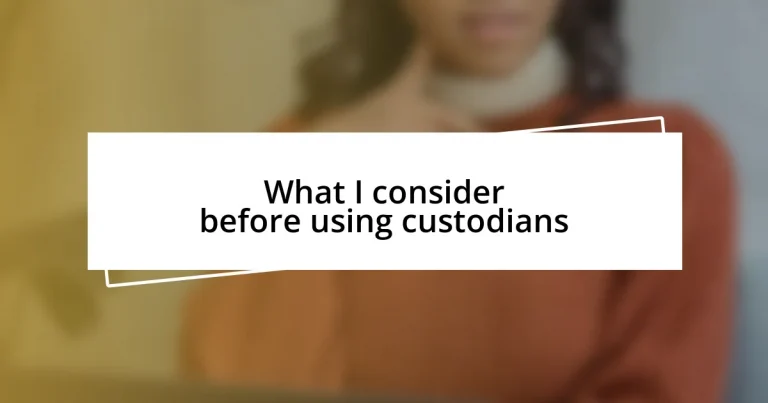Key takeaways:
- Custodians ensure the integrity and compliance of asset management, serving as both protectors and strategic risk management partners.
- Evaluating custodian fees and transparency is critical; understanding fee structures can significantly impact budgeting and satisfaction.
- Assessing a custodian’s reputation, security measures, and customer service, along with their technology and adaptability, is essential for making informed decisions.
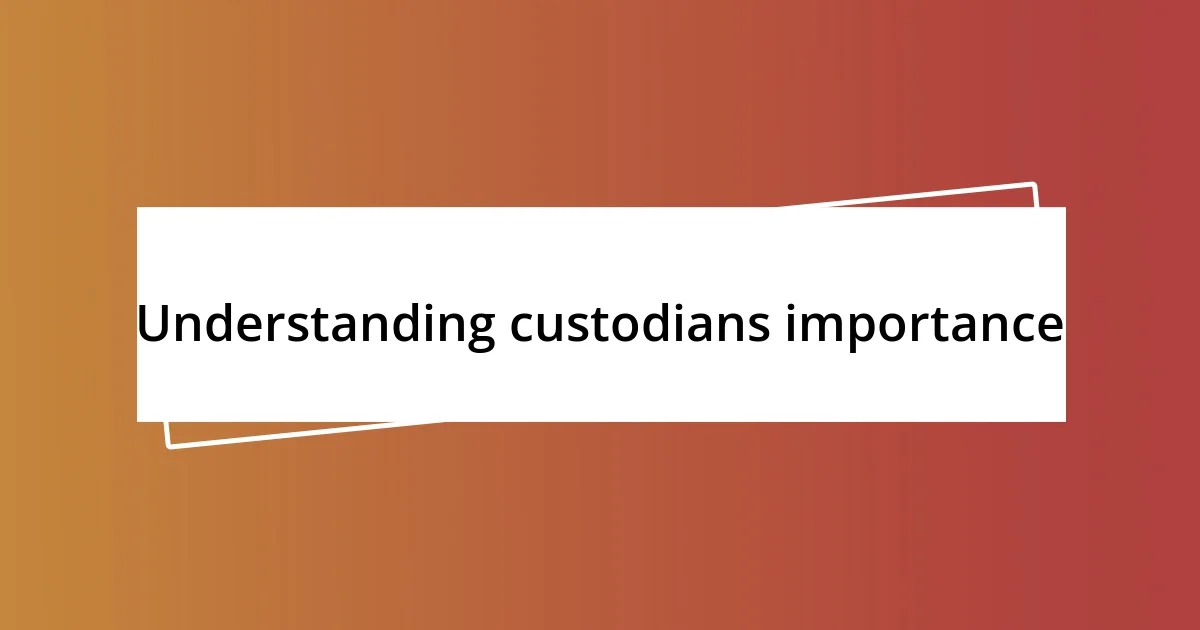
Understanding custodians importance
Custodians play a pivotal role in maintaining the integrity of an organization’s assets. I remember my first encounter with a custodian during a major project; their diligence in managing data preservation brought a sense of security to the entire team. It was such a relief knowing that someone was dedicated to protecting our resources while we focused on our core tasks.
Have you ever considered the peace of mind that comes with knowing your asset management is in capable hands? Engaging a custodian not only protects your investments but also ensures compliance with regulations and industry standards. This can be particularly crucial in sectors where mishandling assets can lead to severe repercussions; I’ve seen organizations thrive when they prioritize custodial services, and I’d always advocate for that strategy.
Additionally, custodians are not just caretakers; they are strategic partners in risk management. I’ve often reflected on the times when their insights helped identify vulnerabilities in systems I hadn’t even noticed. Their expertise transforms the way we view asset management, turning it into a proactive rather than reactive process, which is why understanding their importance is essential for any diligent organization.
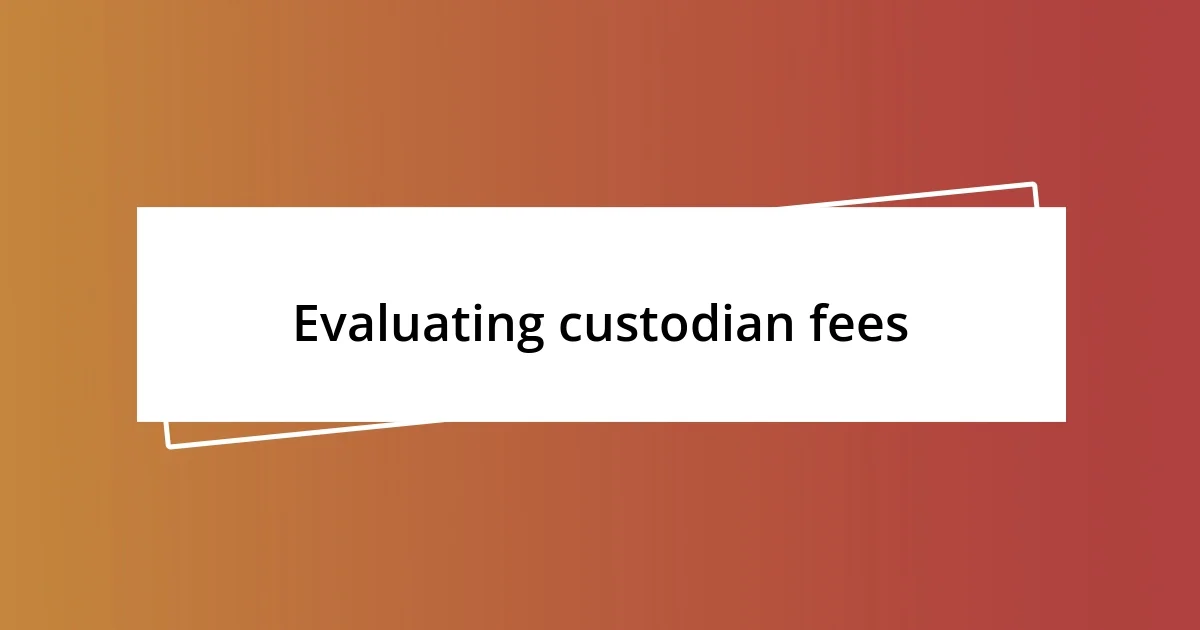
Evaluating custodian fees
Evaluating custodian fees can sometimes feel overwhelming, but understanding what you’re paying for is crucial. I recall a time when I inadvertently signed a contract with a custodian that had hidden fees. It became a learning lesson for me, as I realized transparency is critical. Knowing exactly what each fee covers, whether it’s for asset protection, compliance services, or transaction handling, can make a significant difference.
When assessing custodian fees, consider these factors:
- Base Fees: Look for standard charges for asset management.
- Transaction Fees: Understand costs associated with buying and selling assets.
- Compliance Fees: Inquire about any charges related to regulatory adherence.
- Inactivity Fees: Be aware of fees that kick in if accounts remain dormant.
- Transparency: Evaluate how clearly the custodian outlines their fee structure.
It’s easy to overlook these details, but they profoundly impact your budgeting and overall satisfaction with the custodian relationship. By taking the time to evaluate these fees carefully, you’re positioning yourself for a smoother partnership.
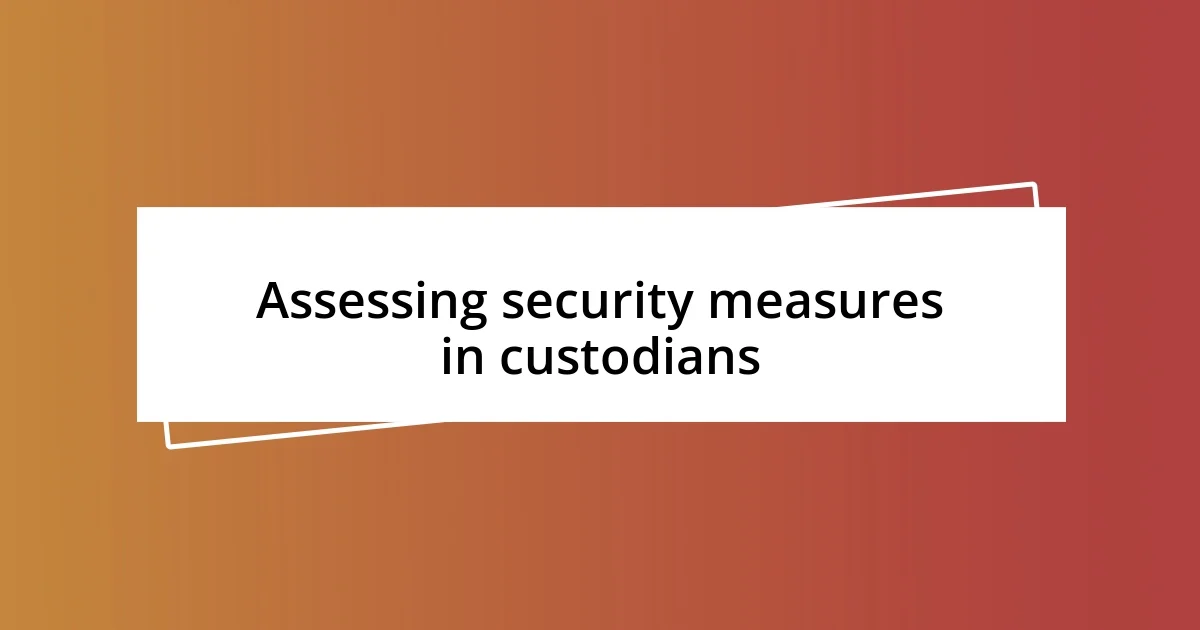
Assessing security measures in custodians
When it comes to assessing security measures in custodians, there are layers of complexity that I’ve learned to navigate over the years. For instance, during one engagement, I was privy to a custodian’s security audit. It revealed the depth of their commitment to safeguarding assets — including advanced encryption protocols and system redundancies that reassured me. Knowing that my information was protected by top-tier security measures gave me a profound sense of confidence and fostered a trust that was invaluable.
Another critical aspect to review is the custodian’s track record concerning data breaches or security incidents. I can’t stress how valuable it is to choose a custodian with a clean history. After working with a custodian who experienced a security breach due to neglect, I learned that proactive risk management was non-negotiable. Consequently, it’s essential to ask about their incident response plans. Are they transparent about the steps they take in the event of a security issue? Being informed about these tactics not only informs your decision but also ensures that you’re partnering with someone who prioritizes safeguarding assets as much as you do.
A custodian’s compliance with industry regulations often speaks volumes about their security measures. In my experience, custodians who adhere to well-recognized standards like ISO or SOC tend to offer more rigorous protections. Think of it this way: if a custodian can demonstrate thorough compliance and regular audits, you can feel more confident in their ability to protect your assets. Here’s a brief comparison table highlighting key security features to consider:
| Security Measure | Description |
|---|---|
| Data Encryption | Ensures information is converted into a secure format during transmission and storage. |
| Incident Response Plan | Outlines steps to be taken in the event of a data breach. |
| Regular Audits | Independent assessments to evaluate security practices and compliance. |
| Compliance Standards | Adherence to recognized frameworks (ISO, SOC) indicating robust security protocols. |
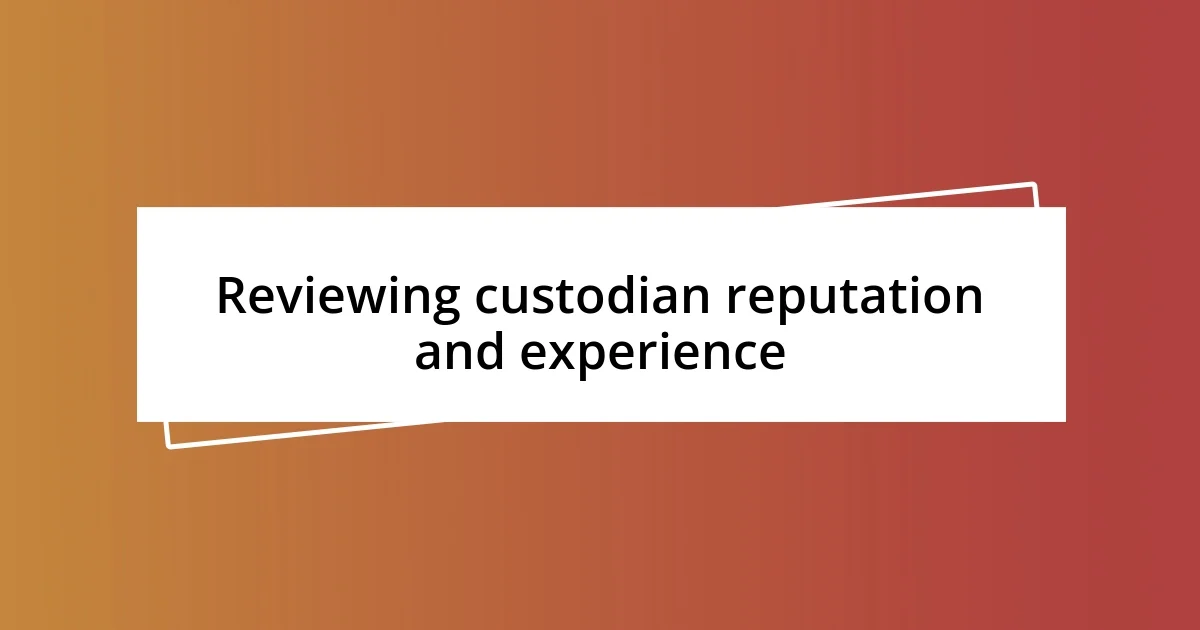
Reviewing custodian reputation and experience
When reviewing a custodian’s reputation, I always start by diving into their history and client feedback. I once read a scathing review of a custodian that highlighted poor client service, which immediately made me rethink pursuing their services. It’s crucial to trust your custodian, and the only way to build that trust is through consistent, positive experiences shared by others.
Experience plays an equally important role in my evaluation process. I find it helpful to examine how long a custodian has been in the industry and their track record with clients. I remember working with a custodian who had decades of experience but failed to innovate with technology. While their long-standing presence seemed reassuring at first, it ultimately highlighted their inability to adapt. This stark contrast between reputation and experience is something I always watch for.
Additionally, I make it a point to check whether a custodian holds any industry certifications or memberships in professional organizations. Are they active in continuing education or attending industry conferences? This commitment often reflects a custodian’s dedication to staying current in best practices. From my experience, custodians who are engaged in continuous learning typically bring higher quality service, as they are keen to keep their knowledge and systems updated. After all, how can you feel secure if your custodian isn’t evolving alongside the industry?
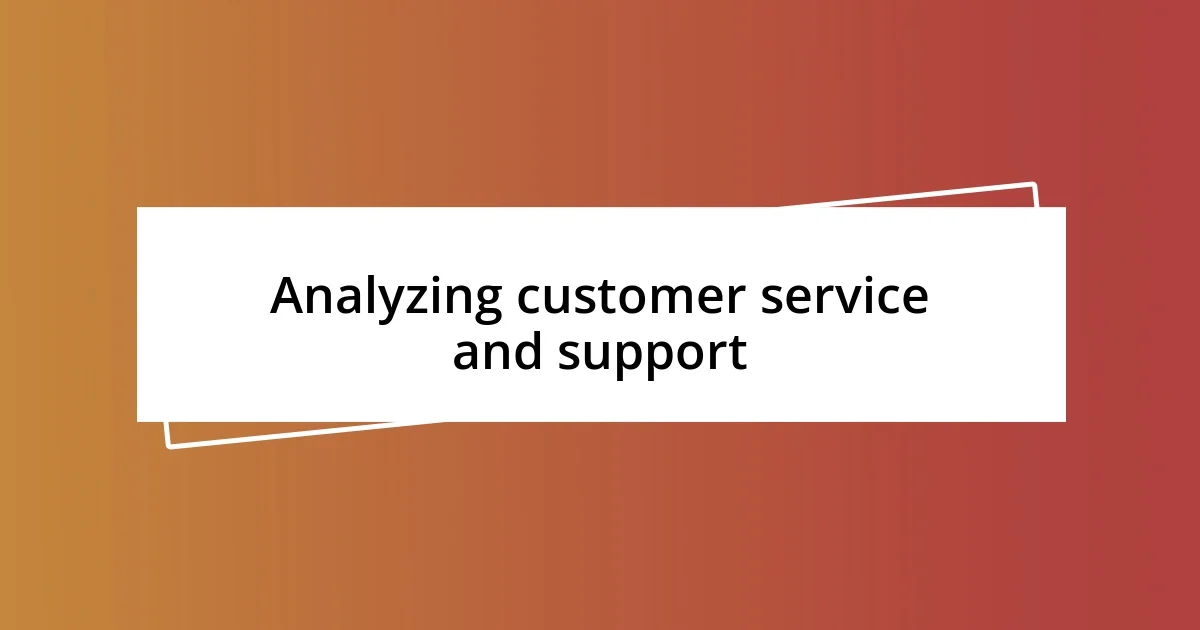
Analyzing customer service and support
When I evaluate customer service and support from a custodian, I prioritize their responsiveness. I recall a time when I reached out to a potential custodian late one evening with a pressing question. To my surprise, they not only answered quickly but provided detailed information that eased my concerns. That experience underscored the importance of timely communication; if a custodian is readily available, it signals that they genuinely care about their clients.
Another critical factor I consider is the effectiveness of their problem resolution processes. For instance, I once had to resolve an issue with a custodian who seemed unprepared and overwhelmed at first. The lack of a structured approach made me question their competence. In contrast, when I encountered a minor issue with another custodian, their clear escalation process and proactive follow-up reassured me that they not only addressed my concerns but valued my partnership. It left a lasting impression on me about their dedication to providing quality service.
Lastly, I think about the overall ease of accessing support channels. Do they offer multiple ways to connect, like phone, email, or live chat? I remember feeling frustrated when a custodian only provided limited options. The moment I found a custodian with an intuitive support portal and user-friendly interface, it felt like a weight lifted off my shoulders. I’ve learned that such accessibility is essential; after all, how can you trust your custodian if reaching them feels like a chore?
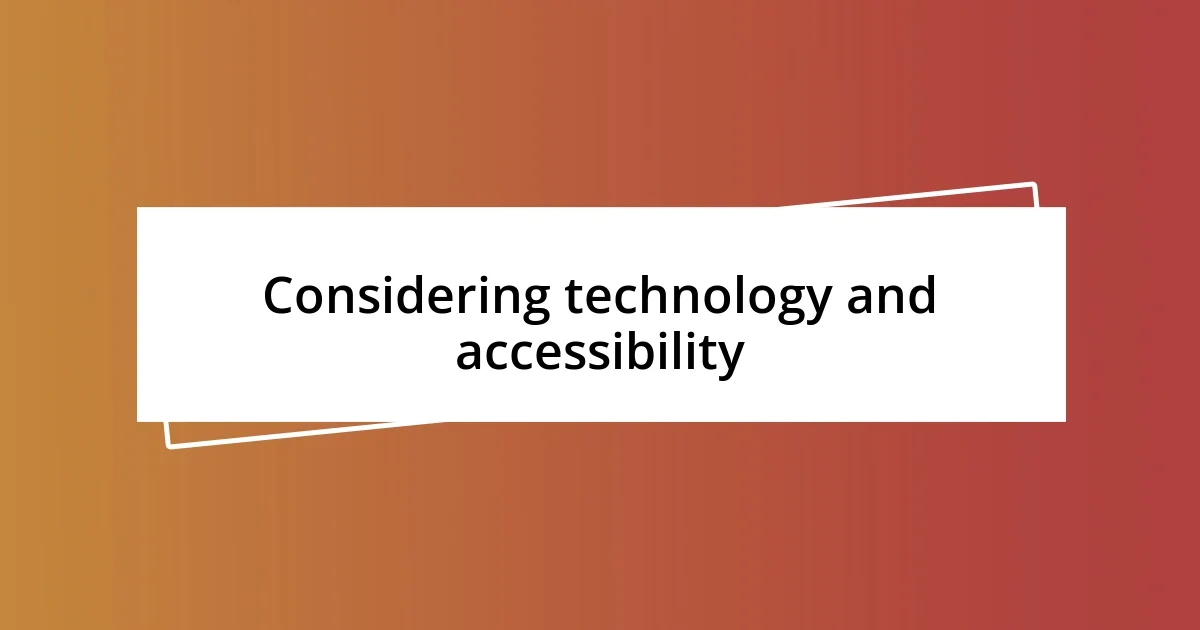
Considering technology and accessibility
When considering technology and accessibility, I can’t help but reflect on how critical a custodian’s digital infrastructure is. I vividly remember a situation where I was trying to access important documents and found myself frustrated with a complicated website. It made me realize that if a custodian’s platform isn’t user-friendly or efficient, it can turn a straightforward task into a major headache. Wouldn’t you agree that navigating a clunky interface is the last thing you want when managing your assets?
Moreover, I think about how a custodian’s technology reflects their commitment to staying current. I once partnered with a custodian that boasted cutting-edge tools, and it was a game-changer. Being able to monitor my investments in real time made me feel empowered. It was like having a virtual assistant at my fingertips. Technology should not just be a buzzword; it should genuinely enhance our experience and accessibility.
Lastly, compatibility with various devices is something I prioritize. Picture this: I’m out and about, and I need to check my portfolio. If I can’t quickly pull up information on my phone, it leaves me feeling disconnected and anxious. I believe that custodians must prioritize accessibility across all platforms, ensuring clients can connect with their services whenever and wherever they need. Isn’t that the level of convenience we all seek?
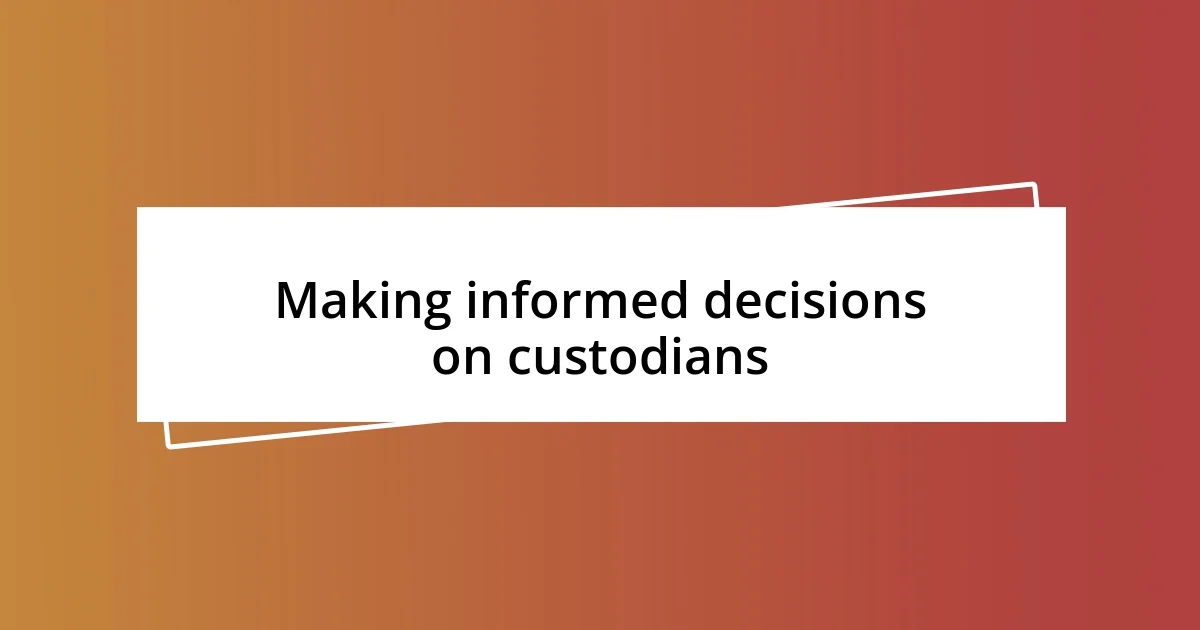
Making informed decisions on custodians
When making informed decisions on custodians, I often reflect on their reputation within the industry. For example, I once did extensive research on a custodian that came highly recommended by peers. However, after digging deeper, I uncovered some concerning reviews about their service during high-demand periods. It made me wonder: if others faced challenges, would I too? Trusting a custodian isn’t just about their promises; it’s about understanding their real-world performance.
Another factor that weighs heavily in my decision is the transparency of their fee structure. I recall my own confusion with a custodian that had a maze of fees, from account maintenance to transaction charges. The lack of clarity left me feeling uneasy, and I questioned whether hidden costs would pop up later. In contrast, when I found a custodian that laid out their fees clearly and honestly, it not only built my trust but also allowed me to plan my finances with confidence. Isn’t it essential to know exactly what you’re paying for?
Lastly, I consider how well a custodian understands my unique needs. I remember a time when I shared my goals with one custodian, and I was blown away by how they tailored their advice. It felt personal, as if they were genuinely invested in my success. That kind of attention to detail is often hard to come by, and it makes all the difference. After all, who wouldn’t want a custodian that views their financial journey as a partnership rather than just another account?












